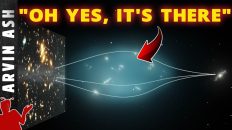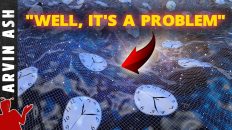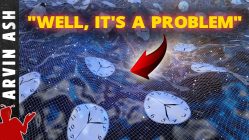CHAPTERS:
0:00 – What is the anomaly?
2:12 – Special offer for AA viewers
2:57 – Best theories in physics
3:46 – Why is there something instead of nothing?
5:57- Matter-antimatter creation
7:16 – Baryogenesis
8:12 – Sakharov conditions
9:15 – C and CP symmetry
11:23 – Weak force violates CP
12:02 – Baryon conservation
13:01 – Theories on matter antimatter asymmetry
SUMMARY:
Why are we here? Why is there something instead of nothing. Part of the answer is rooted in physics. Matter is not the simplest thing there could have been. The simplest thing In physics is nothing, the emptiness of spacetime. So why isn’t the entire universe made of nothing? According to physics, that’s what the universe should be made of, because whenever matter is created, an equal amount of antimatter is also created. But when matter and antimatter meet, they annihilate each other leaving nothing. But for some reason almost everything in the visible universe is made of matter. What happened to all the antimatter?
The Standard model and general relativity do not account for how we got so much matter and almost no antimatter.
First, how did something come from nothing? With quantum mechanics, this “problem” has a workable solution. Nothing, or empty space has quantum fluctuations. Virtual particles are created and destroyed everywhere all the time. Empty space has energy, it can exert a force as can be seen in the Casimir effect. But when matter is created, antimatter is also created which annihilate each other. Antimatter is just like matter, except with the opposite charge.
But, we would expect to see just as much antimatter as we do, matter. But we see only matter. What could have caused this matter antimatter asymmetry? This issue is called the problem of Baryogenesis, which is the physical process in the early universe which caused the imbalance between matter and antimatter.
Russian nuclear physicist Andrei Sakharov proposed that the universe must satisfy 3 conditions in order to create matter and antimatter at different rates.
1. The universe must be out-of-equilibrium
2. The universe must exhibit C and CP symmetry violation
3. Universe must have baryon-number-violating interactions.
The first condition is easy to meet because we live in a universe that is cooling and expanding. It is not in equilibrium.
C symmetry stands for charge conjugation symmetry. It just means that the laws of physics should apply just as equally to antimatter as they do for matter. The weak force breaks C symmetry all the time. This is because neutrinos and antineutrinos only have one type of spin.
CP symmetry is the combination of C symmetry and P symmetry. P stand for parity. This means mirror image. Parity in the context of particles can represent spin, so a particle with a clockwise spin would rotate counter-clockwise for example.
The weak force has processes that violate the CP transformation and thus the CP symmetry. For example K, B and D mesons, which are particles made up of one quark, and one antiquark, can violate CP symmetry when they decay. But there are not enough CP violating interactions to explain the difference in the amount of matter and antimatter volume.
The last condition about Baryon conservation is also a problem. A baryon is a particle composed of 3 quarks. In general, you cannot destroy Baryons, you can only change them. For example, in beta decays a neutron can turn into a proton and vice versa. In order to satisfy the 3rd Sakharov condition, we would need a process such that can make 2 baryons from 1 baryon. We’ve never observed this happening.
So the question remains, what caused the matter-antimatter asymmetry. There are some speculative theories.
#baryogenesis
#matterantimatterasymmetry
One theory is from what Richard Feynman said – that antimatter is mathematically equivalent to ordinary matter moving backwards in time. So perhaps at the Big Bang, antimatter started going backwards in time and never encountered matter. Maybe the universe “banged” in two opposing temporal directions. The problem with this hypothesis is that antimatter that we observe all goes forward in time, not backward.
Some say that there might be mirror antimatter galaxies in distant parts of the universe. But if this was the case, we would expect to see some high energy gamma rays from the border areas where matter objects encountered antimatter objects. Nothing like this is being observed.
One way we may find out is by studying the gravitational wave background, but our instruments are not powerful enough to detect this.







